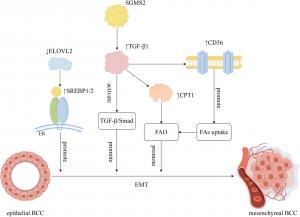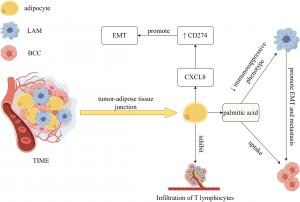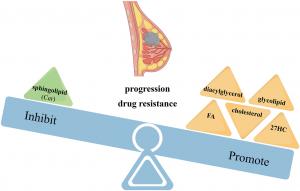The Role of Lipid Metabolism in Breast Cancer Progression and Treatment Resistance

Dysregulation of lipid metabolism promotes EMT (by Figdraw). Down-regulation of ELOVL2 promotes EMT in breast cancer by up-regulating expression of SREBP1/2.
SHANNON, CLARE, IRELAND, April 20, 2025 /EINPresswire.com/ --
Lipid metabolism has emerged as a central player in the progression and therapy resistance of breast cancer, particularly the aggressive subtype known as triple-negative breast cancer (TNBC). This review article highlights how disruptions in lipid regulation can significantly influence the behavior of breast cancer cells, impacting their growth, metastasis, and response to treatment.
Alterations in the metabolism of fatty acids, cholesterol, sphingolipids, and glycolipids are profoundly intertwined with breast cancer cell survival and invasiveness. The uptake and biosynthesis of fatty acids are notably upregulated in tumor cells, which not only fuels cellular energy demands but also supports membrane synthesis and intracellular signaling. Key enzymes and transporters, such as CD36, FASN, and FABP4, are instrumental in facilitating this metabolic shift, thereby enhancing tumor proliferation and metastatic potential.
In cholesterol metabolism, the focus falls on how elevated cholesterol synthesis and its potent metabolite 27-hydroxycholesterol (27HC) accelerate tumor progression and interfere with immune responses. Proteins such as SREBP2, NSDHL, and STARD4 further contribute to this dysregulation, reinforcing cancer cell survival and dissemination. The interplay of 27HC with estrogen receptors and immune-modulatory pathways further complicates therapeutic strategies, particularly in hormone-sensitive and resistant tumors.
The dual nature of sphingolipid metabolism, especially the contrasting roles of ceramide and its glycosylated derivatives, underscores a complex metabolic paradox. While ceramide accumulation exhibits tumor-suppressive effects, including enhanced apoptosis and chemotherapy sensitization, glycosylated forms such as Globo-H ceramide and GD2 are linked to tumorigenesis, angiogenesis, and cancer stem cell maintenance.
A crucial outcome of lipid reprogramming is its role in promoting epithelial-mesenchymal transition (EMT), a process associated with enhanced migratory ability and drug resistance. Factors like ELOVL2, SGMS2, and CXCL8 modulate EMT through intricate signaling cascades, including TGF-β, PI3K/AKT, and SREBP1/2 axes.
Beyond intrinsic cancer cell metabolism, the surrounding tumor immune microenvironment (TIME) also adapts in response to lipid cues. M2 macrophages, cancer-associated fibroblasts, and CD8+ T cells exhibit lipid-driven phenotypic shifts that support tumor evasion and therapy failure.
Resistance to standard treatments—including chemotherapy, endocrine therapy, HER2-targeted therapy, and immune checkpoint inhibitors—is intimately linked to lipid metabolic rewiring. Upregulation of CD36, FASN, CPT1, and GPR120 exemplifies how tumor cells exploit lipid pathways to avoid apoptosis, reduce drug accumulation, and sustain stemness.
# # # # #
Genes & Diseases publishes rigorously peer-reviewed and high quality original articles and authoritative reviews that focus on the molecular bases of human diseases. Emphasis is placed on hypothesis-driven, mechanistic studies relevant to pathogenesis and/or experimental therapeutics of human diseases. The journal has worldwide authorship, and a broad scope in basic and translational biomedical research of molecular biology, molecular genetics, and cell biology, including but not limited to cell proliferation and apoptosis, signal transduction, stem cell biology, developmental biology, gene regulation and epigenetics, cancer biology, immunity and infection, neuroscience, disease-specific animal models, gene and cell-based therapies, and regenerative medicine.
Scopus CiteScore: 7.3
Impact Factor: 6.9
# # # # # #
More information: https://www.keaipublishing.com/en/journals/genes-and-diseases/
Editorial Board: https://www.keaipublishing.com/en/journals/genes-and-diseases/editorial-board/
All issues and articles in press are available online in ScienceDirect (https://www.sciencedirect.com/journal/genes-and-diseases ).
Submissions to Genes & Disease may be made using Editorial Manager (https://www.editorialmanager.com/gendis/default.aspx ).
Print ISSN: 2352-4820
eISSN: 2352-3042
CN: 50-1221/R
Contact Us: editor@genesndiseases.com
X (formerly Twitter): @GenesNDiseases (https://x.com/GenesNDiseases )
# # # # # #
Reference
Wenxiang Fu, Aijun Sun, Huijuan Dai, Lipid metabolism involved in progression and drug resistance of breast cancer, Genes & Diseases, Volume 12, Issue 4, 2025, 101376, https://doi.org/10.1016/j.gendis.2024.101376
Funding Information:
National Natural Science Foundation of China 82303865
Science and Technology Commission of Huaian Municipality, Jiangsu, China HAB202209
Genes & Diseases Editorial Office
Genes & Diseases
+86 23 6571 4691
editor|genesndiseases.com| |editor|genesndiseases.com
Legal Disclaimer:
EIN Presswire provides this news content "as is" without warranty of any kind. We do not accept any responsibility or liability for the accuracy, content, images, videos, licenses, completeness, legality, or reliability of the information contained in this article. If you have any complaints or copyright issues related to this article, kindly contact the author above.
Foundry512 Expands Talent Roster, Hiring for Key Roles Across Media, Accounts, Projects, and Creative
Turner Home Team Expands Home Buying Services Statewide: We Buy Houses Across North Carolina fast for cash.
Sullivan’s Castle Island and Castle Island Brewing Co. Launch 'Rickey Business' Lager to Celebrate James Beard Award
Kalendarium
Więcej ważnych informacji
 Jedynka Newserii
Jedynka Newserii

 Jedynka Newserii
Jedynka Newserii

Prawo

KE proponuje nowy Fundusz Konkurencyjności. Ma pobudzić inwestycje w strategiczne dla Europy technologie
W środę 16 lipca Komisja Europejska przedstawiła projekt budżetu na lata 2028–2034. Jedna z propozycji zakłada utworzenie Europejskiego Funduszu Konkurencyjności o wartości ponad 400 mld euro, który ma pobudzić inwestycje w technologie strategiczne dla jednolitego rynku. Wśród wspieranych obszarów znalazła się obronność i przestrzeń kosmiczna. Na ten cel ma trafić ponad 130 mld euro, pięciokrotnie więcej niż do tej pory.
Firma
Były prezes PGE: OZE potrzebuje wsparcia magazynów energii. To temat traktowany po macoszemu

Choć udział odnawialnych źródeł energii w miksie energetycznym Polski jest stosunkowo wysoki i rośnie, to ten przyrost jest chaotyczny i nierównomiernie rozłożony miedzy technologiami – wskazuje Forum Energii. Dodatkowo OZE potrzebują wsparcia magazynów energii, a zdaniem Wojciecha Dąbrowskiego, prezesa Fundacji SET, ten temat jest traktowany po macoszemu. Brak magazynów powoduje, że produkcja energii z OZE jest tymczasowo wyłączana, co oznacza marnowanie potencjału tych źródeł.
Infrastruktura
Wzrost wynagrodzeń ekip budowlanych najmocniej wpływa na koszty budowy domu. Zainteresowanie inwestorów mimo to nieznacznie wzrasta

Budowa metra kwadratowego domu w Polsce kosztuje od 5,55 do 6 tys. zł w zależności od województwa – wynika z najnowszych analiz firmy Sekocenbud. Najdrożej jest w Warszawie, gdzie cena za metr kwadratowy domu przekroczyła już 6,2 tys. zł. Na przyrosty kosztów budowy domu wpływają zarówno drożejące materiały budowlane, jak i wyższe wynagrodzenia pracowników. Inwestorzy nie rezygnują jednak z budowy domów jednorodzinnych, co ma związek m.in. z wciąż wysokimi cenami mieszkań czy też obniżką stóp procentowych.
Partner serwisu
Szkolenia

Akademia Newserii
Akademia Newserii to projekt, w ramach którego najlepsi polscy dziennikarze biznesowi, giełdowi oraz lifestylowi, a także szkoleniowcy z wieloletnim doświadczeniem dzielą się swoją wiedzą nt. pracy z mediami.










.gif)

 |
| |
| |
|